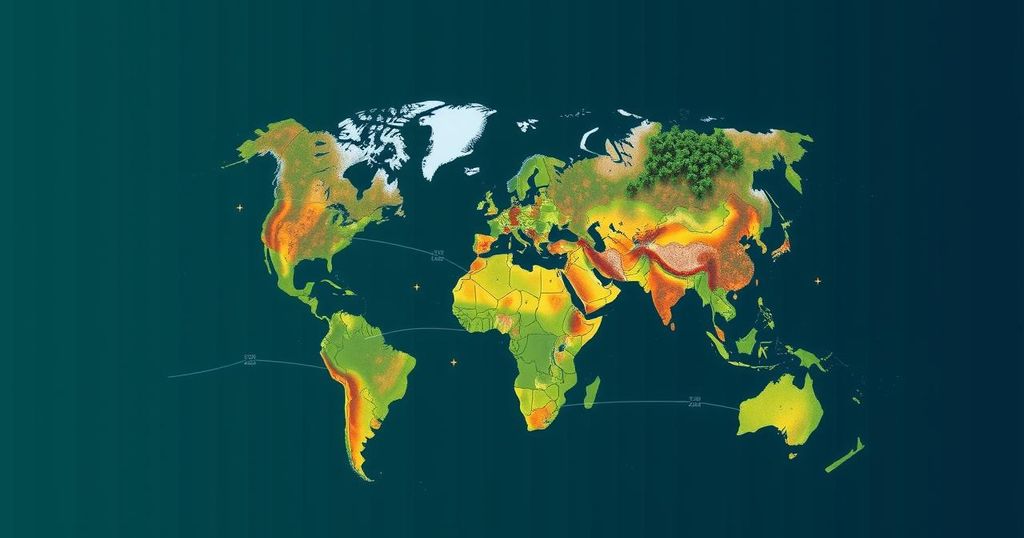Climate Change Poses Record Health Threats, Urgent Action Required

A comprehensive report highlights the severe threats climate change poses to global health. It reveals record levels of health impacts, including increased mortality among the elderly due to heat and the spread of infectious diseases. Although there are signs of progress with reduced deaths from air pollution and increased renewable energy usage, immediate action is required to address the alarming trends and protect public health.
A recent report underscores the escalating health threats posed by climate change, emphasizing that significant delays in addressing this crisis have resulted in severe human costs. As the year approaches what is projected to be the hottest on record, the report, released amidst a backdrop of extreme climatic events such as heatwaves and hurricanes, detailed alarming trends affecting human health. The Lancet Countdown on health and climate change, involving 122 experts including representatives from the World Health Organization, identified that out of 15 health-related indicators monitored over the past eight years, 10 have reached concerning new heights. These indicators include increased deaths among the elderly due to heat, the spread of infectious diseases, and rising food insecurity linked to droughts and floods affecting agriculture. Marina Romanello, the executive director of the Lancet Countdown, indicated that the findings reflect unprecedented threats to health across nations, stating a stark statistic that mortality among individuals aged 65 and older from heat exposure has surged by 167 percent since the 1990s. Furthermore, the geographical expansion of mosquito populations is concerning, with a record over five million cases of dengue fever reported globally last year. The data also highlights a significant calculation of environmental degradation, noting that approximately five percent of the global tree cover was lost from 2016 to 2022, which compromises the planet’s ability to absorb carbon emissions. Industry practices were scrutinized, revealing that major oil and gas companies, despite achieving unprecedented profit levels, continue to exacerbate the climate crisis through increased fossil fuel production and fresh subsidies amounting to $1.4 trillion in 2022. Romanello pointed out that such financial support for fossil fuels starkly contrasts with commitments essential for a sustainable future. Despite the grave concerns raised in the report, some positive developments were acknowledged, including a notable decrease in deaths associated with air pollution from fossil fuels and a rise in the share of renewable energy sources used to generate electricity. Romanello remarked on the growing recognition of health issues in climate negotiations, particularly with the upcoming COP talks. She asserted the urgency of immediate action, stating, “If action is not taken today, the future will be very dangerous. There is really no more time to waste – I know we have been saying this for many years – but what we are seeing is that the wasted time has been paid in lives.” Moreover, she encouraged individuals to adopt a climate-conscious lifestyle. In conclusion, the report serves as a clarion call for immediate action to mitigate the health threats posed by climate change, emphasizing both the dire consequences of inaction and the hopeful signs reflecting progress in pollution reduction and increased reliance on renewable energy.
The report titled the eighth Lancet Countdown on health and climate change presents an overview of how climate change is increasingly impacting human health globally, especially as extreme weather events become more frequent and severe. Released by a coalition of experts, the report highlights indicators indicating deterioration in health outcomes attributable to climate-related factors and warns of the health implications of continued reliance on fossil fuels. It coincides with important global discussions on climate policy, including the forthcoming COP29 talks and associated political considerations in the United States.
In summary, the Lancet Countdown report articulates a pressing need for urgent action to counter the health challenges posed by climate change. It underscores the significant worsening of health indicators, highlights the responsibilities of industries and governments, and calls for individual actions to combat this global crisis. The delicate balance of environmental sustainability and public health continues to hang in the balance, and proactive efforts are crucial for a healthier future.
Original Source: www.barrons.com






